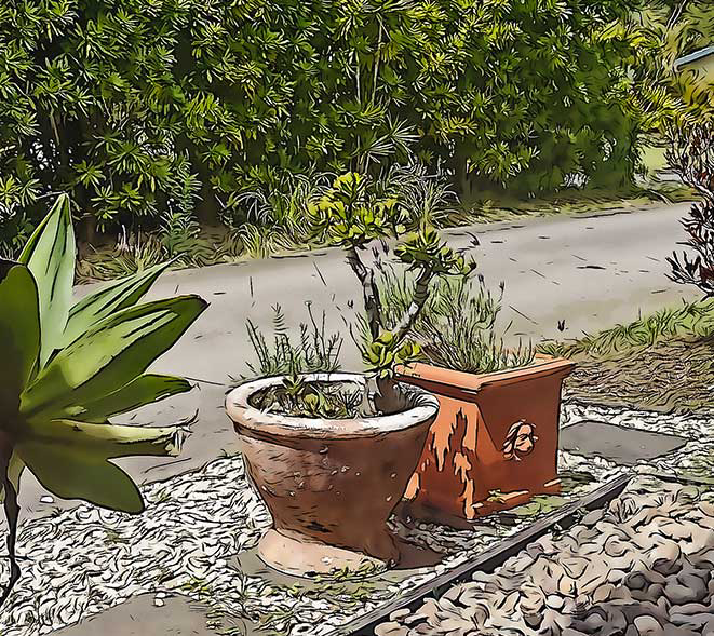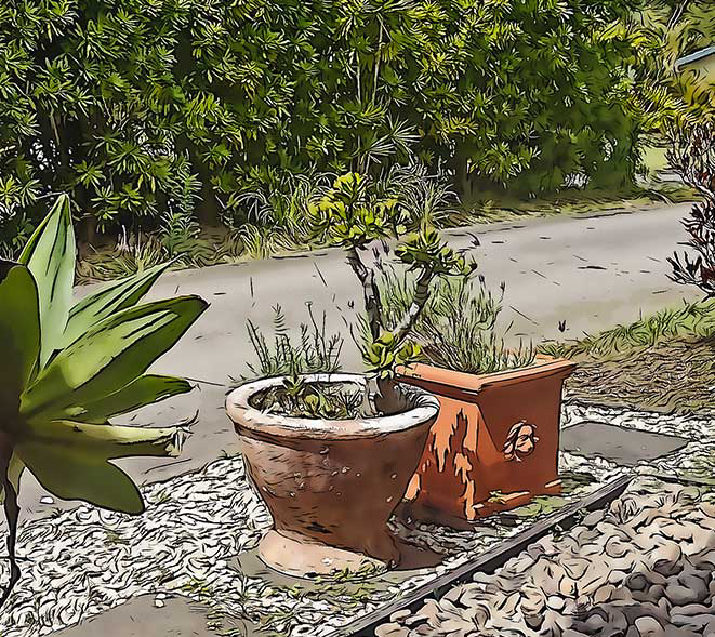The story was running on a bit longer than necessary, I felt, and didn’t want to frighten anybody. Now, however, you’ve had time to digest the details and steel your nerves, so I suppose I could continue the story. But not today. Building suspense is, after all, an important technique of story-telling. And I don’t know about you, but lately I’ve been in no mood for the supernatural. If an apparition appeared before me now, I’d hold up a hand and say, in a firm voice, ‘Not interested, not today. Thank you and goodbye.’
Or – and this is sadly more likely. “Your efforts to scare me are somewhat transparent.” And I’d mention it later in that expressionless, deadpan way of mine, which seems to leave so many completely in the dark as to whether I’m telling the truth. But so you know, any story I write in these newsletters is true. Which you already know, because if I was making any of this nonsense up, I’d characterize myself in a more positive manner..
Take, for instance, what happened the other day. My wife was about to move a worryingly large terracotta pot containing a lavender bush. Naturally, I asked her to step aside so I might move it for her. I didn’t entirely crouch down, unfortunately. I more-or-less leaned over it and tested its weight first, lifting gently with my fingers. I don’t who I did that, and I’ve been wondering ever since. Because that small preliminary effort resulted in me pulling a muscle in my lower back.
“See what I did just then?” I said to my wife, feeling frozen and fearful. “That is not how to lift something heavy. You’re welcome. Now, please help me stagger back into the house, so I can fall face down on the bed and lay there in agony for the next few days.”
Some three days later, I was able to crawl across the room and climb – carefully, carefully – into the chair by the window. It felt like a hell of an achievement at the time. And, of course, all I could see through the window – right in the center of my view – was the terracotta pot. /Mocking me/. Apparently, after helping me into the house, my wife went back outside and moved the pot herself. This is why I think women don’t understand feelings.

Look at it, why don’t you? See how it mocks me?
Anyway, I am finally back on my feet and wandering about the place, doing chores, etcetera. The kitchen had gotten away on my wife, so I remedied that. She hugged me in gratitude, and I said, “There, there, it’s difficult, isn’t it, when men are so indispensable?”
So, I suppose I am avenged.
All I’ve been doing this past month is thinking about the new book I’ve been writing, the sequel to that one I finished recently. What this entails, so you know, is sitting in a chair and staring intensely out the window for many consecutive hours. You know, slightly upwards and to the left of the terracotta pot.
Sometimes, I simply walk around and ignore everything but my own thoughts. (I have thought about taking a sledgehammer to the terracotta pot. In the name of justice, you know. But I haven’t done it yet because I don’t want to have the conversation about it with my wife afterwards).
I’ve never had any trouble concentrating on things. I can think about the same thing all day, if necessary. That’s more or less all I do. Interestingly, psychologists have been writing books lately about the fact people don’t do this anymore. Nobody can focus, apparently. It’s a problem, I suppose. Devices. Or social-media, or something. I don’t know; I don’t read these sorts of books; they seem boring.
And just to be clear, my ability to imagine things all day is not considered a superpower. A psychologist might describe this trait as maladaptive daydreaming. It seems to me, however, that every worthwhile novel that has ever been written has come about through a process of immoderate imagination. In short, maladaptive daydreaming.
Also, somewhat worryingly, it turns out that a person can focus too much, according to psychologists. They call it ‘hyper-focus’, and – I’m not making this up, I promise – such behavior is apparently associated with attention deficit disorder. The point here, I suppose, is that most people focus too little, and that’s a problem, but others focus too much, which is also a problem. Some people imagine things all day (like me) and that’s a disorder, whilst others have no imagination whatsoever (I gather they’re called ‘middle managers’).
So in summary, we should all be somewhat creative, but not too creative. We must each of us stay equidistant of two points; unruly genius on the one side, and blistering banality on the other. I mean, I think that’s what’s going on. Has anybody else got a theory about why so many people talk unashamedly for hours about how they prefer their coffee?
But this is not about imagination, it’s about attention. Don’t pay too much – that’s a disorder – and don’t pay so little that you become a burden to everyone around you. (Perhaps assuming oneself an expert epidemiologist during a global pandemic, despite having never opened a medical textbook in one’s life. To offer a random example.)
It’s interesting, isn’t it? Though let’s not focus on the topic too long. We mustn’t get carried away, apparently.
Sometimes, I wonder how psychologists became respected authorities on the subject of creativity. Years ago when I was a creative director, I don’t remember any research psychologist showing up at my office with questions. This was at an Ivy League university; the School of Public Health was in the building next door. They were too busy handing out surveys to students, I suppose. If modern psychology can teach us anything, it’s about how American undergraduates think. Though frankly, if I wanted to understand the human condition, I wouldn’t go anywhere near a Harvard undergrad. In fact, if I wanted to feel any sense of hope for the future of the human race … but I digress, we were talking about attention, weren’t we?
What do psychologists want from us these days? I simply do not know. Perhaps they just want our attention. What I do know is that I no longer read their articles. I don’t even go to social media. It’s probably good for my well-being, but who knows? Who can I possibly ask? The psychologists who work at social media companies? The ones at marketing firms, advising on the proper construction of clickbait?
Or perhaps they want to help us? Perhaps I could talk to a psychologist about my maladaptive daydreaming? I’ll admit that my last novel was written in a /fugue/. And its sequel, apparently, is an idée fixe. I go to sleep excited to dream about my book. Everything on Netflix seems dull to me because my imagination is a virtual reality that responds readily to every whim. I can move forward and backward through the narrative. I change costumes and dialogue at will. As much as humanly possible, my primary residence is within that reality.
In that way, I do not fully or enthusiastically participate in consumerism. I barely watch television. I don’t click on advertisements, I block them. I don’t want things, I only want to write and hang out with my kids. Though I will say that despite being maladaptive, despite suffering a disorder, I could probably teach people how to be more imaginative. I don’t, however, because I don’t have a degree in psychology. Though to be fair, if you want to know how people think – how they /really/ think, that is, you’ll need to read a good novel.
I’ve just remembered another unflattering episode in my life. Back in the day when I had a respectable career, I was invited to a party at a loft in San Francisco. Everyone, apart from myself, was a scientist of some sort at some famous institution or other. There was a MIT professor of neurobiology. Someone there was an expert on nanotechnology. Anyway, I abruptly found myself chatting uncomfortably with a newly graduated psychiatrist from Harvard Medical School – my then employer. Actually, they were two psychiatrists, each newly married to the other.
“Oh, you’re both psychiatrists!” I exclaimed with excitement. “This is amazing! I have this question … I’ve always wanted to ask a psychiatrist this, /ha ha/, but you probably get this all the time, but … no, seriously, I have to ask …”
I paused for effect. “Where can I buy a good couch?”
They stared at me blankly. I stared back. It was awkward. The room became quiet around us. For a little while, they looked at each other. Then one of them asked – you know, with earnestness and sincere interest and curiosity, “Was that a joke?”
I was never invited back. There’s sort of a glass ceiling for people with my sense of humor. Anyway, I write books now.
With chaste affection,
Kris St Gabriel




